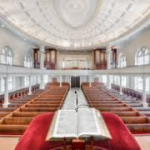it is one of the earliest patristic writings we possess. It is a lengthy treatise which compares the God of Christianity with the gods of the barbarians, the Egyptians, and the Greeks.
But, at one point, he summarizes what Christians believe in a manner that would rival even the Apostle’s Creed:
The Christians, then, trace the beginning of their religion from Jesus the Messiah; and he is named the Son of God Most High. And it is said that God came down from heaven, and from a Hebrew virgin assumed and clothed himself with flesh; and the Son of God lived in a daughter of man. This is taught in the gospel, as it is called, which a short time was preached among them; and you also if you will read therein, may perceive the power which belongs to it. This Jesus, then, was born of the race of the Hebrews; and he had twelve disciples in order that the purpose of his incarnation might in time be accomplished. But he himself was pierced by the Jews, and he died and was buried; and they say that after three days he rose and ascended to heaven (Apol. 2).
Aristides makes it clear that Christians affirm a number of key truths:
1. The divinity of Jesus: “God came down from heaven…” In the mind of Aristides, Jesus is not an angel, or a semi-divine being, but the very God of heaven itself.
2. The incarnation: “clothed himself with flesh.” In very vivid language, the author affirms that Jesus is God enfleshed; he took upon himself a real human body (contra the Docetists).
3. The virgin birth: “from a Hebrew virgin.” This doctrine flows naturally from the prior two. If Jesus is God, and he took on human flesh, then his conception would be distinctive from other human beings.
4. The authority of the Gospels: “taught in the gospel…and you also if you read therein, may perceive the power which belongs to it.” Notice for Aristides, there are books called a “gospel” which you can “read” to learn more about the person of Jesus. Moreover, these gospels contain a certain “power” which the reader can discern.
5. The authority of the apostles: “and he had twelve disciples.” Aristides recognizes that Jesus had an authority structure through the twelve that was necessary “so that the purpose of his incarnation might in time be accomplished.”
6. His death on the cross: “pierced by the Jews.” This is a clear reference to Jesus’ crucifixion under Pontius Pilate at the request of the Jewish leadership.
7. His resurrection: “after three days he rose.” Jesus did not stay in the grave but was raised from the dead.
8. His ascension: “ascended into heaven.” Jesus returned to his former heavenly home, in a position of power and glory.
This is a surprisingly thorough and wide-ranging summary of core Christian doctrines at a very early point in the life of the church. And it was this form of Christianity that was publicly presented to the Emperor. Once again, we can see that core Christian beliefs were not latecomers that were invented in the fourth century (or later), but appear to have been in place from the very beginning.


